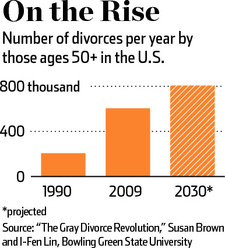It has been said that, other than the death of a spouse, divorce creates the most amount of changes to one’s life in the shortest amount of time. This can certainly be overwhelming, even if you’re just thinking about getting a divorce. There is so much at stake. What about the children? What about the finances? What about the house? What about the pets? What about everything that we have and everything else that has been a part of our lives together?
When we walk down the aisle on our wedding day, and make the vow of “Till death do us part”, we are usually full of hopes and dreams of living a happy life filled with love and support and security and family. We believe in ourselves as a couple. We believe that our individual lives combined will be greater and better than our lives when we were not connected to each other in marriage. We actually plan on staying together until we are parted by death. What happens to that vow, however, when we are now thinking about divorce? How can we reconcile promising to love, honor and cherish each other until death with getting a divorce?
Divorce, in actuality, is a death. It is the death of those dreams that we had as we were walking down the aisle. It is the death of the relationship that used to be. It is the death of the love that was once shared. It is the death of the life that was built on promises of being together forever. And with that death, we need to grieve.
We need to understand and come to terms with what is happening in our lives. We need to address and deal with the very strong emotions that have now entered out lives. We need to learn how to restructure our lives, individually and in the context of our lives as a whole. We need to have compassion for ourselves and others as we navigate this new and (usually) scary territory.
Most of the time, depending on the circumstances of the divorce and the issues involved in making this decision, there is a grieving process that we go through that is the same as in a physical death. There may be shock, denial, anger, bargaining, sadness and depression and acceptance. Most of the time, we do not go through these stages in order and only once. It is very normal to jump around from one feeling to another in the span of minutes, days, weeks, and even months and years. Eventually, though, we settle into our own experience of resolution.
In the midst of all of this, however, there is good news. Once we begin dealing with our feelings and the changes that we need to make in our lives, we usually find that we now have room for dreaming again. We remember what once was, and we begin to feel hope for what could be. We need to nurture that part of us that believes in the possibility of good, even while we are in the trenches of what is often really bad. When we are well on our way in our healing process, we may open ourselves up to the possibility of having a happy relationship again. Hopefully, this relationship will be healthier than what was before we got divorced.
Divorce can be a long and arduous journey. We need to care for ourselves physically, emotionally, mentally and spiritually. In good times and in bad. In sickness and in health. To love, honor and cherish ourselves and our lives. We can certainly make these vows to ourselves, until we have truly parted from this world.
Deborah S. Wilder, Ph.D.
Psychologist, Divorce Mediator, Parenting Coordinator



